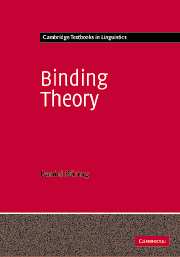Book contents
- Frontmatter
- Contents
- Preface
- 1 The ABC of Binding Theory
- 2 Interpreting indexed structures
- 3 Domains and orientation
- 4 Binding versus coreference
- 5 Other cases of semantic binding
- 6 The Coreference rule
- 7 Descriptive pronouns and individual concepts
- 8 Semantic binding and c-command
- 9 Plurals
- 10 Reciprocals
- 11 Exempt anaphora and reflexivity
- 12 Binding and movement
- Bibliography
- Index
9 - Plurals
Published online by Cambridge University Press: 05 June 2012
- Frontmatter
- Contents
- Preface
- 1 The ABC of Binding Theory
- 2 Interpreting indexed structures
- 3 Domains and orientation
- 4 Binding versus coreference
- 5 Other cases of semantic binding
- 6 The Coreference rule
- 7 Descriptive pronouns and individual concepts
- 8 Semantic binding and c-command
- 9 Plurals
- 10 Reciprocals
- 11 Exempt anaphora and reflexivity
- 12 Binding and movement
- Bibliography
- Index
Summary
The semantics of plural NPs
What is the denotation of a plural NP such as we, they, yourselves, Heidi and Tor or the trombones? We assume that these are referring expressions, and denote pluralities. For example, 〚the trombones〛g is the plurality consisting of all (contextually salient) trombones, and 〚Heidi and Tor〛g denotes the plurality consisting of Heidi and Tor.
Technically, a plurality is an individual, just like the denotation of a singular NP like he or Sidney is; where we need to distinguish them, we call the latter atoms (as opposed to pluralities). So atoms and pluralities together make up the domain of individuals, De.
Being an individual, a plurality like 〚Heidi and Tor〛g is different from a QNP denotation like 〚each of Heidi and Tor〛g (which is a generalized quantifier, cf. chapter 4, sections 4.1 and 4.5.2); note, for example, that you can say Heidi and Tor make a good couple, but not *Each of Heidi and Tor make a good couple. It is also different from the set containing Heidi and Tor (e.g. the denotation of the VP is Heidi or Tor). This is important to keep in mind, since thinking of plural NPs as denoting sets is probably the analytical option that comes to mind first (see e.g. Bennet [1994]).
- Type
- Chapter
- Information
- Binding Theory , pp. 188 - 202Publisher: Cambridge University PressPrint publication year: 2005

